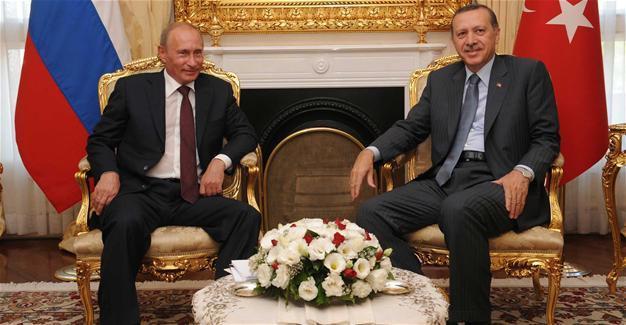Turkey, Russia to hold cooperation meeting after two-year delay
Sevil Erkuş - ANKARA
 Russia and Turkey’s respective presidents, Vladimir Putin and Recep Tayyip Erdogan, will meet on March 10 for the sixth meeting of their bilateral high-level cooperation council in Moscow, as relations continue on the delicate path of normalization following a spat over Turkey’s downing of a Russian jet in 2015 that led to the cancelation of the meeting later that year.
Russia and Turkey’s respective presidents, Vladimir Putin and Recep Tayyip Erdogan, will meet on March 10 for the sixth meeting of their bilateral high-level cooperation council in Moscow, as relations continue on the delicate path of normalization following a spat over Turkey’s downing of a Russian jet in 2015 that led to the cancelation of the meeting later that year. Prime Minister Binali Yıldırım had a phone conversation with his Russian counterpart, Dmitry Medvedev, on March 9 to discuss the meeting, with Medvedev saying he had signed a decree allowing some agricultural products to be exported from Turkey to Russia, state-run Anadolu Agency reported.
Foreign Minister Mevlüt Çavuşoglu, Energy and Natural Resources Minister Berat Albayrak, Defense Minister Fikri Işık, Economy Minister Nihat Zeybekci, Agriculture Minister Faruk Çelik, Culture and Tourism Minister Nabi Avcı, Transport and Maritime Affairs Minister Ahmet Arslan and Justice Minister Bekir Bozdağ will also be included in the Turkish delegation, while Chief of General Staff Gen. Hulusi Akar will also participate in the visit.
Syria to top agenda
Erdoğan plans to discuss the issues of Iraq and Syria in detail during his meeting with Putin, spokesperson İbrahim Kalın told reporters on March 9, adding that the outcomes of the recent Antalya meeting of the top generals of the United States, Turkey and Russia would also be assessed.
Turkey and Russia are currently coordinating their military activities in Syria, especially around the town of al-Bab, which the Turkey-backed Free Syrian Army (FSA) has seized from the Islamic State of Iraq and the Levant (ISIL). There is an ongoing effort to prevent a military standoff between FSA fighters and the Syrian army south of the town, as well as a potential Turkish-Syrian confrontation.
However, Russia’s cooperation with the Syrian Kurdish People’s Protection Units (YPG) and the Democratic Union Party (PYD) has frustrated Ankara, with Moscow proposing a draft constitution to Syrian opposition groups in Astana including “cultural autonomy” for the Kurdish population of the country and hosting PYD representatives in Moscow after allowing them to open a representative office in the country.
Agreements to be signed
The parties will sign several agreements, Kalın said, adding that discussions will also include process that have launched since normalization in June 2015, but not completed yet. The spokesperson was referring Russia’s resistance to clearly lifting restrictions on trade and economy.
Turkey has urged Russia to make a discount in the price of natural gas imported by Turkey, lift all prohibitions on the exports of Turkish agricultural products to Russia, waive visas for business leaders and tourists and increase the number of work permits for Turkish nationals in Russia. Moscow has been lifting sanctions on Turkey that were imposed after the jet crisis, but Moscow has only been taking gradual steps.
While there were around 40,000 Turkish citizens in Russia before the crisis, the number has been reduced to 13,000 due to the visa and other subsequent restrictions.
Turkey proposes travel with identity cards
Turkey has proposed to Russia that its nationals be allowed to travel to Turkey without passports and only with their identity cards, Çavuşoğlu told journalists on March 9. Çavuşoğlu hinted that Moscow would lift trade sanctions on agricultural exports from Turkey to Russia, as well as ease visa procedures for Turkish business people and truck drivers.
A cooperation agreement in the field of mining, as well as a memorandum on the creation of a joint investment fund between the Russian Direct Investment Fund and Turkish Investment Fund are among the documents that will be inked during the meeting. The two countries will also declare a joint year of culture and tourism in 2019.
Turkey earlier proposed to Russia that they conduct trade in their local currencies. Zeybekci told reporters on March 9 that the Turkish and Russian officials from central banks have discussed the issue and that a swap treaty was close to being completed and could even be signed during the visit to Russia.
“We see that the pace is the opposite of the rhetoric of ‘normalize as soon as possible,’” Zeybekci said.
After the start of the normalization process, Russia removed sanctions on some products, particularly on citrus fruits, but the majority of the sanctions remain in place.
The Turkish Stream and the Akkuyu nuclear power plant are also expected to be part of the energy discussions. The Turkish Stream natural gas pipeline project agreement between Turkey and Russia was signed in October 2016 and ratified by Putin on Feb. 7.
















